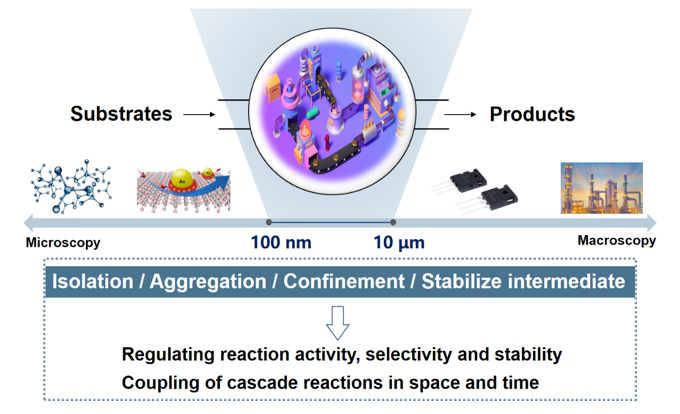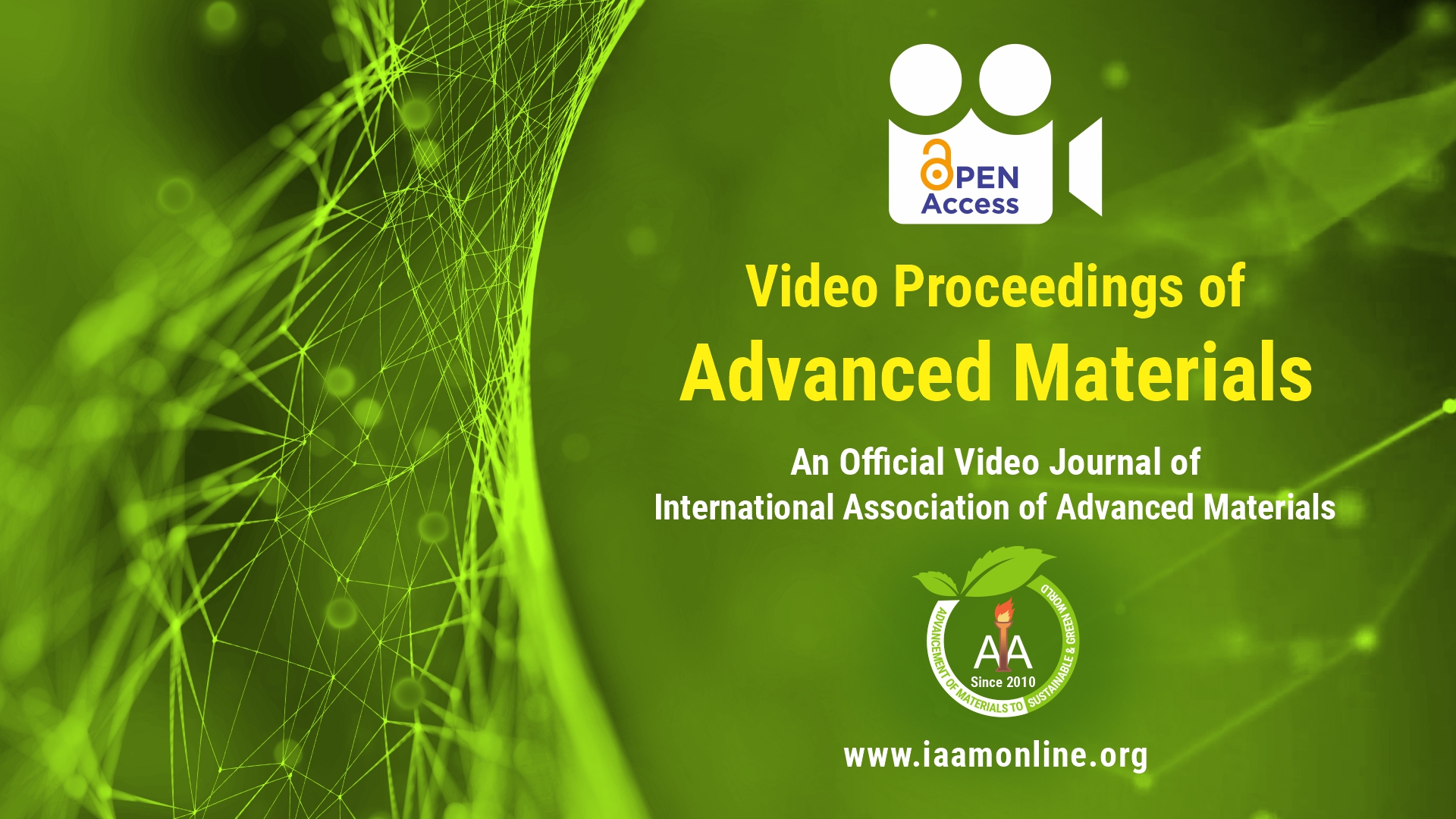Video Article Open Access
Nanoreactors for Sustainable Catalysis
Jian Liu1,2
1State Key Laboratory of Catalysis Dalian Institute of Chemical Physics, Chinese Academy of Sciences 457 Zhongshan Road, Dalian 116023, China
2DICP-Surrey Joint Centre for Future Materials, Department of Chemical and Process Engineering, and Advanced Technology Institute, University of Surrey, Guilford, Surrey GU2 7XH, UK
Vid. Proc. Adv. Mater., Volume 2, Article ID 2107197 (2021)
DOI: 10.5185/vpoam.2021.07197
Publication Date (Web): 23 Jul 2022
Copyright © IAAM
Graphical Abstract

Abstract
Nanoreactors as a kind of advanced materials have been widely applied in energy catalysis and biomedical application. Nanoreactors are like organelles that has special active sites for the catalytic reactions. The main characteristics of nanoreactors are such as controlling the reaction microenvironment, confinement effects, compartmentalization or accumulation of various types of elementary reactions. These characteristics would help improve the catalytic performance. Thus, the nanoreactors could be recognised as a special kind of sustainable catalytic materials. Herein, the purpose of our research is to design sustainable carbon-based nanoreactors to investigate the catalytic reactions of homogeneous catalysis in heterogeneous systems, in particularly for the conversion of small molecules (N2/H2O/CO2) and organic molecules (e.g., nitrobenzene, phenylacetylene). A confined Fe-Cu clusters on graphitic carbon nitride as sub-nanometer reactors was fabricated for efficiently regulating the electrochemical nitrogen reduction reaction [1]. We provide new strategies of manipulating catalysts active centers at the sub-nanometer scale. Furthermore, a Ru/M@OG nanoreactor was designed to achieve exceptional electrochemical hydrogen evolution reaction performance, demonstrating that atomic metal species on the carbon substrate can remotely communicate with the supported metal nanoparticles, inducing synergistic electronic coupling with the nanoparticles and enabling the control of their electrocatalytic activity [2]. To precisely control the metal location and study the void-confinement effects, we synthesized a pair of hollow carbon sphere (HCS) nanoreactors with presynthesized PdCu nanoparticles encapsulated inside of HCS (PdCu@HCS) and supported outside of HCS (PdCu/HCS) [3]. It is found that hydrogenations of alkenes over PdCu@HCS are shape-selective catalysis. In addition, a yolk-shell-structured Pd&ZnO@Carbon submicroreactors are shown to be a highly selective catalyst (selectivity >99%) and superior catalytic stability for hydrogenation of phenylacetylene to phenylethylene [4]. The solvothermal treatment and carbonization process of uniform zeolitic imidazolate framework-8 (ZIF-8)@resin polymer core-shell structures leads to the generation of yolk–shell-structured ZnO@carbon. Therefore, the construction of artificial cells, namely carbon-based nanoreactors with tunable structure, and the composition and properties are desirable for sustainable catalysis [5].
Keywords
Nanoreactors; sustainable catalysis; selectivity.
Acknowledgement
Our works were supported financially by the National Natural Science Foundation of China (21905271, 11974068, 91961204, and 21905202), Liaoning Natural Science Foundation (20180510029), and the Dalian National Laboratory for Clean Energy (DNL), CAS, DNL Cooperation Fund, CAS (DNL180402), and the Supercomputing Center of Dalian University of Technology. The authors would like to thank Prof. Qihua Yang and Prof. Can Li for fruitful discussion.
References
- X. Wang, S. Qiu, J. Feng, Y. Tong, F. Zhou, Q. Li, L. Song, S. Chen, K.Wu, P. Su, S. Ye, F. Hou, S. Dou, H. Liu, G. Lu, C. Sun, J. Liu, J. L. Advanced Materials, 2020, 32, 2004382
- P. Su, W. Pei, X. Wang, Y. Ma, Q. Jiang, J. Liang, S. Zhou, J. Zhao, J. Liu, G. Lu, Angewandte Chemie International Edition, 2021, in press, https://doi.org/10.1002/anie.202103557.
- C. Dong, Q. Yu, R. Ye, P. Su, J. Liu, G. Wang, Angewandte Chemie International Edition, 2020, 59, 18374-18379.
- H. Tian, F. Huang, Y. Zhu, S. Liu, Y. Han, M. Jaroniec, Q. Yang, H. Liu, G. Q. Lu, J. Liu, Advanced Functional Materials, 2018, 28, 1801737.
- H. Tian, J. Liang, J. Liu, Advanced Materials, 2019, 31, 1903886.
- J. Liu, N. Wickramaratne, S. Qiao, M. Jaroniec, Nature Materials, 2015, 14, 763-774.
Biography
Jian Liu is a Professor at Dalian Institute of Chemical Physics, Chinese Academy of Science, China, he also held an adjunct professor position in Department of Chemical and Process Engineering, University of Surrey, UK. His research focuses on the design of micro-nanoreactors, porous carbon spheres, and industrialization of homogeneous catalysis in heterogeneous systems. Dr. Liu has been PI/CI on over £4 M in sponsored research (including three ARC DP grants, one ARC LP grant, Chinese Government Funding, two international linkage grants from the Australian Academy of Sciences, and four UQ major grants) in the last ten years, and as of May 2021, has published more than 220 peer reviewed journal articles including top ranking journals such as Nature Mater., Nature Commun., Angew. Chem. Int. Ed., Adv. Mater., JACS, Chem. Sci., Chem. Soc. Rev., et. al. 1 book, 10 book chapters. A recent search (May 2021) of ISI Web of Science shows his entire publications have been cited for over 17000 times. He has an H-index of 60. He was listed as 2018-2020 Highly Cited Researchers from Clarivate Analytics in Cross-Field. He is the Editor-in-Chief of Materials Today Sustainability (Elsevier), Associate Editor of Frontiers in Chemistry and Frontiers in Bioengineering and Biotechnology (2016-2019), and also as an editorial member for Materials Today, Materials Today Energy, Chinese Journal of Catalysis, etc. As recognition of his achievements in research, he was honoured with a prestigious UQ Foundation Research Excellence Award, Australian Postdoctoral Fellowship (APD), JSPS Invitation Fellowships, UQ Postdoctoral Research Fellowship, President Award (Chinese Academy of Sciences) and a Young Scientists Award of the 14th International Congress on Catalysis.
Video Proceedings of Advanced Materials

Upcoming Congress



